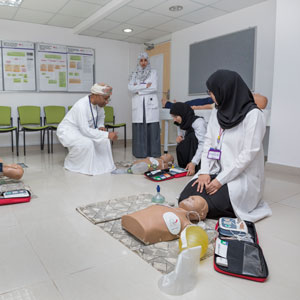
Anesthesia
Help the oTo create enough Omani Graduates of highest quality to lead the specialty in the country and attain self-sufficiency in manpower.
To enhance the recruitment of Omani graduates into the specialty of anesthesia and critical care. To train the graduates in the areas of knowledge, skills and attitude specific to anesthesiology, critical care medicine and pain management to current international standards. Upon completion of training, a resident is expected to be a competent specialist anesthesiologist, capable of functioning independently.
Throughout the anesthesia training program, all trainees undergo summative assessments designed to assess knowledge and skills, quantify experience, and to estimate the individual trainee's eligibility to progress to further stages of training or to a career post. The assessment can be done on daily basis, mid-block, at the end of the block and at the end of the training program.
The following formative assessment forms are completed by the Trainers/Rotation Supervisors to assess the performance of the Residents during their training.
In-training Assessment Report (ITAR) - (End of Block Evaluation)
Assessment of Procedural skills form
Mini-Clinical Exercise
Presentation evaluation form
Case-based discussion
Journal Club Evaluation
Multisource feedback (360 degree)
Research Block Evaluation
Progression Examinations
OMSB End of Year Exam
OMSB Part 1 Exam
Exit Qualification
OMSB Part II (Written and Clinical Exam)
Optional Examinations
Arab Board Exam:
Part 1 Written Exam
Part 2 Written and Clinical Exam
MCAI (College of Anesthetists of Ireland Membership Examination
Teaching ScheduleOur scheduled monthly full-day academic teaching is assigned from 8:00 AM – 4:00 PM. It includes lectures, case-based discussion, journal club, mortality and morbidity, data interpretation, MCQ practice. The presentation must be interactive, up-to-date, evidence based and clinically oriented as much as possible. Residents should attend at least 75% of the academic activities in an academic year to be eligible for promotion from one level of training to a higher level. Event Schedule
Assessment projected schedule
Examination projected schedule
|
PROGRAM DIRECTOR
Dr. Saleh Saud Hamed Al Abri
ASSOCIATE PROGRAM DIRECTORS
Dr. Abdel Kader Mansour Mahfoudh
Dr. Abdullah Al Jadidi
Dr. Badar Al Hasani
Dr. Madan Mohan Maddali
Dr. Nasser Al Kemyani
MEMBERS
Dr. Ahmed Abu Draz
Dr. Huda Al Khalili
Dr. Jyoti Burad
Dr. Maher Jaffer Abdulrahim Al Bahrani
Dr. Moosa Mansoor Awladthani
Dr. Nasser Abdullah Nasser Al Kemyani
Dr. Ramlaa Malallah Abdullah Al Qassab
Program Medical Executive:
Ms. Vian Francia
Program e-mail:
Office number:
2418-1094
